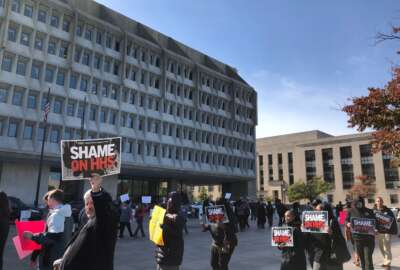
Impasses panel rewrites HHS-NTEU bargaining agreement, sets stage for telework, leave changes
A decision from a federal impasses panel may set the stage for policy changes on telework and employee leave at the Department of Health and Human Services (HHS).
After a series of lengthy negotiations and disagreements between the Department of Health and Human Services and its union, a labor-relations panel has largely rewritten more than a dozen collective bargaining proposals, which may set the stage for new telework, leave and other policies at the agency.
The Federal Service Impasses Panel (FSIP), a body of seven presidentially-appointed members who serve as a component of the Federal Labor Relations Authority, last week upheld the majority of HHS’ proposed changes to its existing collective bargaining agreement with the National Treasury Employees Union (NTEU).
The FSIP decision rules on a total of 22 proposals that either HHS or NTEU submitted throughout the course of several months of contentious negotiations. The decision itself rewrites portions of the existing HHS-NTEU collective bargaining agreement, and if the CBA articles move forward unchallenged, may set the course for a variety changes to current telework, leave and official time policies at the department.
Most notably, the impasses panel ruled HHS can continue to move forward with a new telework proposal, which the agency said is designed to set the “expectation” that employees report to their official worksite for a minimum of four days a week.
“In the panel’s view, an expectation is not tantamount to a requirement,” Mark Carter, FSIP chairman, wrote in the April 1 decision. “That is, while supervisors may fairly ‘expect’ employees to report to the agency’s facilities for a set number of days, the panel does not believe that the agency’s proposal establishes a requirement that they do so.”
FSIP tweaked the proposal’s language slightly after HHS and NTEU reportedly sparred over what exactly this proposal meant. The two parties appeared to disagree on HHS’ telework proposal since the details of the agency’s new contract article became public back in December.
The new proposal reads: “The agency will not establish a minimum number of days per week for employees with a telework agreement to report to their official worksite. However, employees should expect to report to the official worksite and duty station a minimum of four days a week. For employees on a compressed work schedule, the employee’s regular day(s) off will count as a day away from the official worksite for the purpose of this language.”
Nearly 16,000 HHS employees — or 19 percent of the agency’s workforce — teleworked three days or more in fiscal 2016, according to the most recent Office of Personnel Management data available. Roughly 13 percent, 11,366 employees, teleworked one-to-two days a week, while 17 percent, or 14,296 employees, used telework on a situational basis.
NTEU requested more employee participation data from HHS, according to the FSIP decision, but the agency never provided it.
The HHS proposal also sets a variety of requirements that employees must meet as a condition of teleworking. Employees, for example, must have a rating of at least “fully successful” on their last performance appraisal to participate.
New proposals on leave, official time and office space
Leave and official time policies may also change.
Under the FSIP decision, HHS employees will need to request official time through “an orderly system” that “emphasizes the importance of ensuring a sufficiently staffed workforce,” the decision reads.
HHS employees would also have less time — 30 minutes after the start of the duty day versus the current two hours — to inform their management of their intention to take sick leave.
In addition, supervisors would have more flexibility to reject an employee’s request to take leave, unless the employee can find a suitable replacement to cover a missed shift.
The FSIP decision also allows HHS to charge NTEU rent for its use of agency office space and supplies, which was one of the provisions in the President’s May executive orders.
Trump’s workforce executive orders shifted HHS-NTEU negotiations
HHS and NTEU have been locked in heated bargaining discussions for the past year. Both parties had spent much of December discussing new bargaining proposals with help from a federal mediator, which the impasses panel ordered after HHS had declared an impasse in negotiations over the summer.
NTEU has said it approached HHS about reopening its contract back in July 2015. The two parties spent two years negotiating the ground rules for contract discussions but couldn’t agree.
But the President’s May 25 executive orders on collective bargaining and official time revived negotiations. HHS in June offered bargaining proposals to NTEU, which originally excluded previously-agreed-to articles in NTEU’s current contract and detailed negotiated policies on telework, alternative work schedules, transit subsidies, performance awards and appraisals and reassignments and details.
NTEU offered up its own proposals this summer. Both parties had met a few times briefly in July before HHS made a final offer, according to the union. When the parties couldn’t agree, another impasse was declared.
Joanna Friedman, a partner with the Federal Practice Group, said she’s been involved in agency-union negotiations over the past year that resemble the HHS-NTEU debate.
“Right now in terms of collecting bargaining and union rights in government, it’s a very ugly, ugly environment for members of a union,” she said in an interview with Federal News Network.
Though a federal district judge invalidated nine key provisions in the President’s workforce executive orders, the court’s decision hasn’t necessarily changed how agencies are approaching negotiations with their unions.
Instead, the EOs have given agencies a playbook for proposals they might offer during bargaining negotiations, Friedman said.
The FSIP decision doesn’t weigh in on all of the HHS-NTEU bargaining proposals. But the panel did offer up its opinion on articles that the two parties didn’t get a chance to discuss on their own.
Because there were some articles of the HHS-NTEU contract that the two parties didn’t negotiate over, these proposals aren’t final, the union’s national president, Tony Reardon, said.
NTEU has filed a few unfair labor practice complaints against HHS, which the union has said it will pursue.
“NTEU, with the support of our allies in Congress, is working to restore a normal bargaining process that allows management and labor to reach an agreement that benefits the agency, the employees and the taxpayers,” Reardon said in a statement.
Copyright © 2024 Federal News Network. All rights reserved. This website is not intended for users located within the European Economic Area.
Nicole Ogrysko is a reporter for Federal News Network focusing on the federal workforce and federal pay and benefits.
Follow @nogryskoWFED






